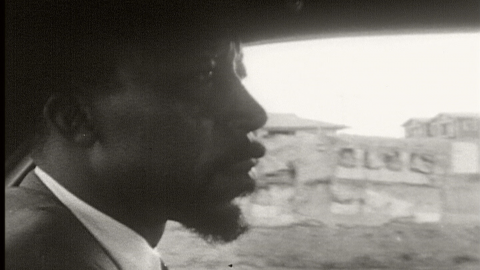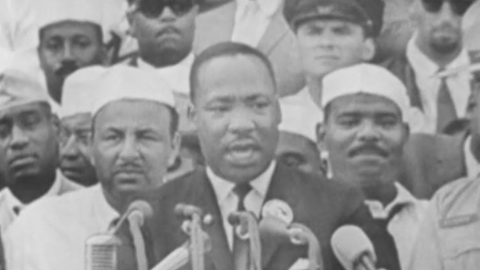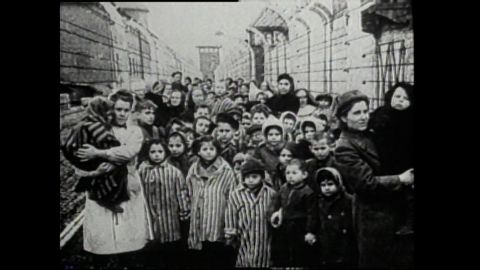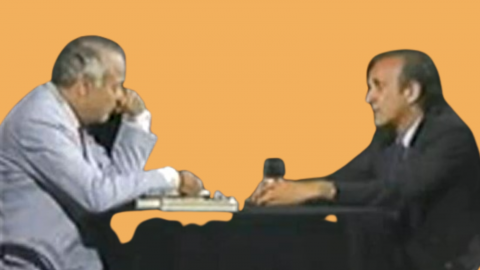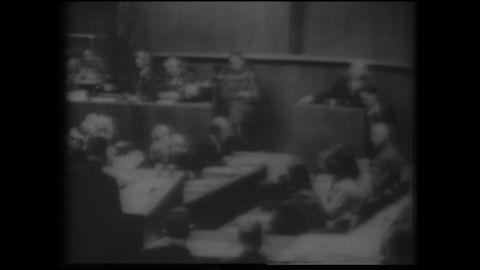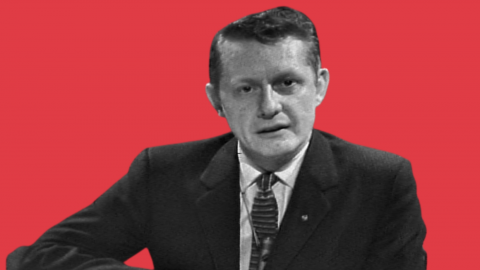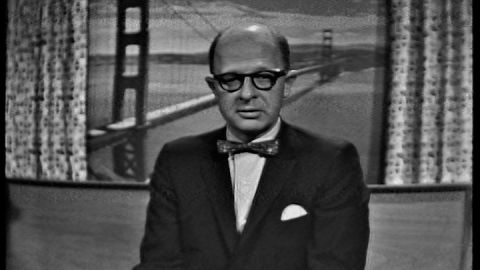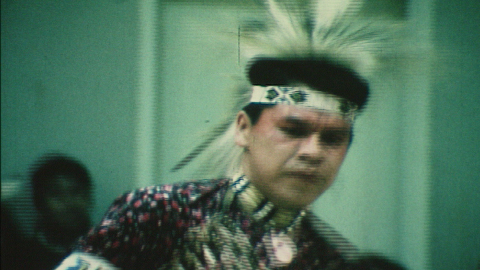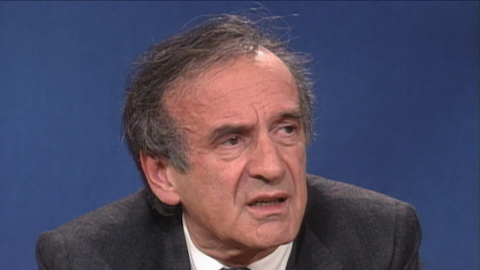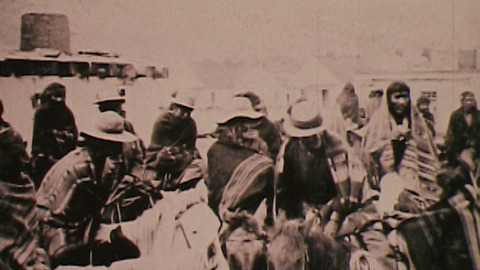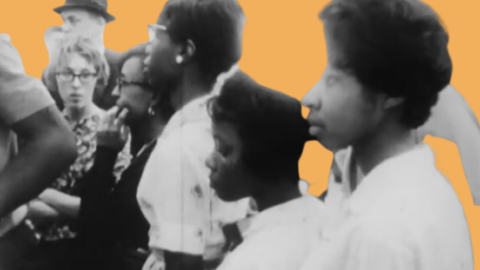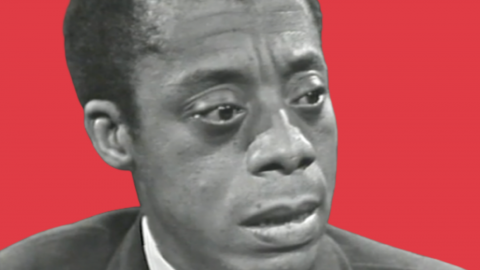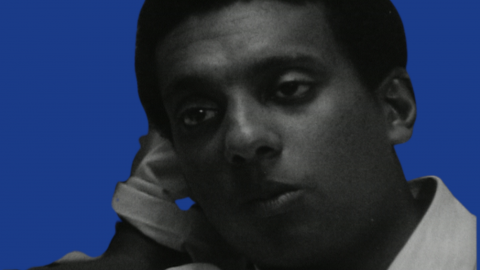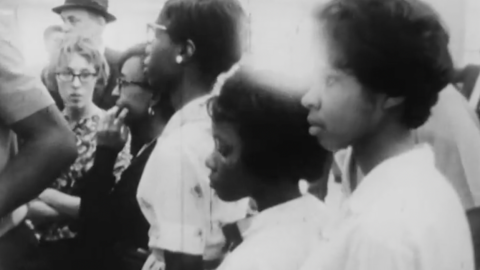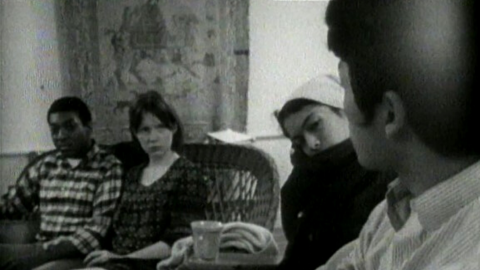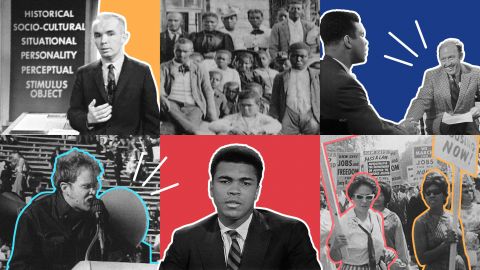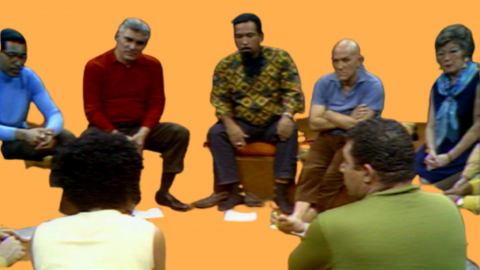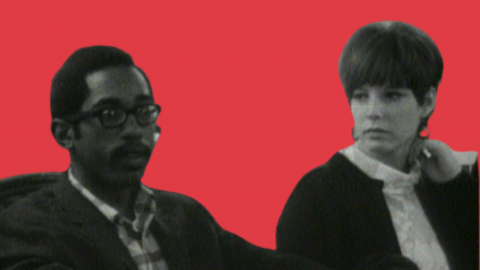>> San Francisco?
>> Yes.
>> Oh, man, I'm gonna tell you
about San Francisco.
San Francisco ain't for me.
I mean, ever since I got out of
high school, I had a couple of
jobs.
I worked at a couple of past
companies and, uh, warehouses.
I mean, after a while, they say,
"Well, I guess we gonna lay you
off for a couple of weeks,"
you know.
They talk about the South.
The South is not half as bad
as San Francisco.
You want to tell me about
San Francisco?
I'll tell you about
San Francisco.
The white man, he's not --
He's not takin' advantage of you
out in public like they doin'
down in Birmingham.
But he's killin' you with that
pencil and paper, brother.
When you go to look for a job,
can you get a job?
Can you get a job, Winkle?
>> This is the San Francisco
Americans pretend does not
exist.
They think I'm making it up.
>> National Educational
Television presents...
"Take This Hammer."
>> ♪ Take this hammer ♪
>> This is a film report on a
visit to the city of
San Francisco by the novelist,
essayist, and playwright
James Baldwin.
Mr. Baldwin's guide on this tour
of the city is the
executive director
of Youth For Service,
Orville Luster.
>> ♪ Take this hammer ♪
♪ And carry it to the captain ♪
♪ You tell him I'm gone ♪
♪ You tell him I'm gone ♪
>> The drive from the airport
into any American city looks
pretty much the same.
You could be anywhere.
But for James Baldwin,
this similarity goes deeper.
On the drive into San Francisco,
Baldwin began talking about
the increasing bitterness,
demoralization, and despair of
Negro youths in northern cities.
And it was decided that we would
explore the existence of such
attitudes and conditions in the
city of San Francisco, with its
widely advertised liberal
and cosmopolitan traditions.
Baldwin also talked about his
concept of dues paying,
or living up to one's
responsibility, and commented
that many northerners seem to
feel that because they do not
live in Mississippi, they are
somehow paying their dues.
>> I think the truth is that
everyone, on the one hand, is
fundamentally capable of paying
his dues, but no one pays his
dues willingly.
You know?
And the white man, like the
black man, like any other man on
Earth, can pay his dues if he
realizes that that's what he's
got to do.
As long as you think there's
some way to get through life
without paying your dues,
you're gonna be bankrupt.
The bill has come in.
It's not coming in. It is in.
And the very question now
is precisely what we've got
in the bank.
This will cost us everything
we think we have.
Everything.
And Birmingham is an incident,
you know, which may become a
shrine.
What is really crucial is
whether or not the country,
the people in the country, the
citizenry, are able to recognize
that there is no moral distance,
no moral distance,
which is to say no distance
between the facts of life
in San Francisco and the facts
of life in Birmingham.
We've got to call, you know,
we've got to tell it like it is.
And that's where it's at.
>> ♪ Oh, I said I wasn't gonna
tell nobody ♪
♪ But I ♪
>> ♪ Couldn't keep it to
myself ♪
>> ♪ Oh, I ♪
>> ♪ Couldn't keep it to
myself ♪
>> ♪ Oh, I ♪
>> ♪ Couldn't keep it to
myself ♪
>> ♪ Said I wasn't gonna tell
nobody ♪
♪ But I ♪
>> ♪ Couldn't keep it to
myself ♪
>> ♪ Oh, I ♪
>> ♪ What the lord has done for
me ♪
>> ♪ Oh, I said I wasn't gonna
tell nobody ♪
♪ But I ♪
>> ♪ Couldn't keep it to
myself ♪
>> ♪ Oh, I ♪
>> ♪ Couldn't keep it to
myself ♪
>> ♪ Oh, I ♪
>> ♪ Couldn't keep it to
myself ♪
>> ♪ I said I wasn't gonna tell
nobody ♪
♪ But I ♪
>> I imagine it'd be easy for
any white person walking through
San Francisco to imagine that
everything was at peace because
it certainly looks it that way,
you know, on the surface.
San Francisco's much prettier
than New York.
And it's easier to hide in
San Francisco than it is in
New York because you've got the
view, you've got the hills.
You've got the San Francisco
legend, too, which is that
it's cosmopolitan and
forward-looking.
But it's just another American
city.
And if you're a black man, that
means that's a very bitter thing
to say.
Children are dying here as they
are in New York for the very
same reason.
But, see, it's a somewhat better
place to lie about it.
That's really all it comes to.
Nobody wants to destroy the
image of San Francisco.
>> Old city.
>> Oh, yes. Yes.
>> I'd like to acquaint you
with, uh, San Francisco
as a whole, Mr. Baldwin.
And I think, mostly, that what's
being watched here today is
somethin' black, and the young
people go to school together,
they graduate off the same
stage, and then when it comes to
jobs, the black face is not
qualified, but they graduate.
Then my daughter has to go clean
up the same girl's house that
she graduates off the stage.
As I said, the most that's
being watched is the black face.
>> What we were talking about
last night, coming in from the
airport, was the real situation
of Negroes in this city...
>> Yes.
>> ...as opposed to the image...
>> That's right.
>> ...San Francisco would like
to present.
>> Yes.
>> Well, why don't you tell me
a little bit about it?
I know a lot about New York,
but I'm a stranger here.
Let's say I'm sure the --
I'm sure the, um, principle
holds, but I'm curious about the
details.
>> Well, one thing about it
in this particular area,
about 80% of the people in this
area are Negro.
This is a real large housing
project.
There's -- As far as delinquency
is concerned, we rank about
fourth.
The job situation is bad.
This is a real black belt
of San Francisco.
I think that, uh,
the lady over to your left,
Mrs. Nichols, is a good
representative of one of the
indigenous leaders in this area.
>> Tell me something.
It may sound like a stupid
question, but it's a question I
have to ask myself all the time.
What, precisely, do you say
to a Negro kid, um...
to, um...invest him with...
a morale which the country
is determined he shan't have?
Or to spell that out much more
specifically, when dealing with
a Negro kid and trying to insist
that he know that he can do
anything he wants to do,
how do you make him believe it?
>> That's a difficult question.
I think that, uh,
that one of the main things
that we have to make and
believe...
You know,
they say everybody can be the
President of the United States.
>> That's true.
>> And then, uh...this boy,
uh, grows up and he comes up.
But by the time he gets 14 or
15 years old, he begins to find
out that, uh, that, uh, this --
this is not true and to make
him, uh, face --
be able to face what's coming to
him in the future.
>> ....be a Negro president
in this country.
>> There'll never be a Negro
president in this country?
Why do you say that?
>> We can't get jobs.
How we gonna be a president?
>> Exactly.
But I want you to think about
this.
There will be a Negro president
of this country, but it will not
be the country that we are
sitting in now.
What if you say to yourself,
"There never will be a Negro
president of this country?"
And what you're doing
is agreeing with white people
who say you are inferior.
It's not important, really, you
know, whether or not there's a
Negro president, I mean, in that
way.
What's important is that you
should realize that you can
become -- you can become the
President.
There's nothing anybody --
anybody can do that you can't
do.
>> Well, the truth is if you get
them, if you get --
I don't -- I don't think this is
an exaggeration.
I think the truth still is that
even when you get to the most
meager opportunity, you've got
to be at least five times as
good as anybody else around,
five times as good not only at
the job, but...
This is what is so dangerous,
I think.
You have to have a certain...
The boys that I grew up with,
I grew up in the streets
in Harlem.
And of the survivors,
what marks all the survivors
is a certain ruthlessness
which was absolutely
indispensable when -- when we're
going to survive.
>> I can do it.
I can do it. I can do it.
I don't have to work --
I don't have to work for nobody
and I can make it.
I don't have to work --
>> But how do you make it?
>> What you mean, how I make it?
This is something -- I'm not
gonna tell you how I make it.
Lookit, I'm indicting myself,
brother, talking to you.
You go back and tell the police
what I did.
[ Laughter ]
>> I didn't say you were doin'
nothin'.
>> No, you're doing that for --
What if I tell you that I robbed
a bank in Los Angeles?
You believe that?
>> Well, no, if you --
if you don't say you did.
>> I ain't gonna say I did,
neither.
>> The things you'll be talking
about now, their real problem
is that they cannot find,
in the country, any -- any
reason to accept anything the
country says.
And they're very young, so they
can't find anything else,
either.
And this is how they end up,
for example, on the needle.
It's a crime committed by
one section of the population,
of the populace,
against another section
of the populace.
And it's a crime which really
could destroy this country.
>> What do you think about the
police?
>> I think they have a purpose.
But, then again, the way some of
these people do you sometimes
when they pick you up and stop
you...
Or, like, a couple of times
we'd be downtown just walkin'
around, they'd look at you.
If you look suspicious,
they would just stop you.
Like, I was goin' to a show
one night, me and my wife.
And we just happened to go
around Market Street, and we
seen this police car go by.
All right, we can turn the
corner then make the corner.
They meet us. And they stop us.
Our show starts at 7:45.
We were out there till 9:00.
But then they didn't have no
excuse to stop us.
But they stopped us, searched
the car, call in, and this and
that.
And what was the purpose of
that?
We weren't doing anything wrong.
Nobody was mad.
Let me ask you one thing.
What do police do when they get
mad?
>> What do the police do when
they get mad?
>> I mean, we ordinary citizens.
When we get mad, we can do
things to hurt people and rob
and steal.
What -- what do they do when
they get mad?
Who do they take their steam off
on?
>> I think you know the answer
to that question.
>> Well, I couldn't answer that
because the police has never
bothered me in that way.
But I read newspapers, and I've
been livin' around here all my
life and I see things goin' on.
>> Mm-hmm.
Well, when a policeman gets mad,
he's got a gun.
And he's got a club.
Yeah.
>> It's one thing
that's different in, uh,
San Francisco and Birmingham,
it is that San Francisco is
whitewash.
>> Yeah. Precisely.
>> Yeah.
>> In San Francisco, it's under
the rug.
>> Yeah.
>> You know, it hasn't hit the
headlines yet, and everyone --
everyone in San Francisco,
every white person in
San Francisco pretend they
haven't got a Negro problem.
Everywhere I have been in this
country, if you talk to a white
person, he says race relations
are excellent, and I've yet to
find a single Negro in this
country who agrees with that.
>> And then if you ask that the
Negro have a better opportunity,
ask that Negro be hired in a
large firm, they only reach out
and hire one just to shut your
mouth.
>> And put him in the window.
>> Well, Mr. Baldwin, I'd like
to also say that Hunters Point
seems to me, in my opinion,
the way you're lookin' at it,
Hunters Point is just like
being in Alabama right now.
>> Mm-hmm.
>> And I feel that we don't --
some of the ones that can't go
down, we can -- we can march on
San Francisco for the black man,
to help the black woman.
We can do that here because it
has been stated that until we
work on this, San Francisco
and other areas --New York and
all Chicago and all around --
that we can get something done.
We can help our brothers
in the South.
>> In the South, yes.
>> Those -- The black people
in Alabama are my people.
>> Yes, yeah.
>> Primarily, I'm from Texas.
>> Mm-hmm.
>> But anywhere in the South,
anywhere a Negro is -- a black
man is involved, I'm there.
>> Mm-hmm.
>> I'm the mother of five kids,
the mother of a 9-week-old baby.
But if the time comes where
I can't march here in
San Francisco, I certainly will
beg, borrow a ticket to go to
Alabama.
>> Mm-hmm.
>> And I am ready.
>> ♪ You are the reason ♪
>> ♪ You're the reason ♪
>> ♪ That saved my soul ♪
>> ♪ Saved my soul ♪
>> ♪ That Sunday morning ♪
>> ♪ Sunday morning ♪
>> ♪ I put my ♪
>> ♪ Knees on the ground ♪
>> ♪ Oh ♪
>> I suppose that no one in
San Francisco has any sense of
what a dangerous area this is.
And I think this is one of the
real troubles that the Negro has
in San Francisco --
He doesn't really know his place
because it hasn't been really
spelled out.
>> Yeah.
>> And he's trying to find his
place, and it's so...
This is one of the problems,
you know what I mean?
What place is there for me?
You know, he came out to escape.
And then you keep trying...
>> And this is another prison.
>> That's right. You know?
And you find yourself facin' the
Pacific Ocean, you know?
>> Yeah.
>> There's no place else to go.
>> Yes. Yeah.
>> You know?
Now, you can see this is...
>> Yeah.
>> More residences and even
apartments and so forth.
Coming down, we will soon be
to Market Street.
>> The great problem is how in
the world one is going to
invest these children with a new
morale, a sense of their own
worth because the country isn't
gonna do it.
The country won't do it.
I suppose one can say as long as
the country can't do it, then
he'll be able to choose his own
worth.
>> We have no race here.
We have no race at all.
>> We have no flags.
>> No.
>> No cut.
>> Think they're better.
>> No.
>> The white man? Oh!
>> Tell me what you mean.
>> You know what I mean?
>> Take what you want.
>> Huh? Tell me what you mean.
>> What I mean?
>> Yeah.
>> I mean, I'm tryin'...
>> No, we gonna tell it, man.
We gonna tell it.
>> I don't have nothin' over
here.
>> No, no.
>> Nothing over here?
>> Nothing.
I don't have anything.
>> Where the man at?
>> How long you felt that way?
>> How long I felt that way?
Since 1956.
>> Since 1956?
>> Yeah.
>> Why did you feel that way?
>> Huh?
>> Why did you feel that way?
>> Because I realized what a dog
the white man was.
>> How did you come to realize
it?
>> When he got to start jumpin'
on me and puttin' me in jail and
everything, you know.
>> Where did that happen?
>> Where?
Right here in San Francisco...
>> Right here in San Francisco?
>> California. Wasn't nothin'.
>> Tell me how it started.
>> How it started?
What you mean, how it started?
>> Tell me about the first time
you were arrested.
>> First time I was arrested?
>> Yeah.
>> Well, that was...
>> That was in 1948.
>> That was in 1948?
>> Yeah.
>> What for?
>> Well, I don't know what they
call it, but I got caught in a
bedroom with a little white
girl, said she was a juvenile.
>> [ Laughs ] Where was that?
>> Right here in San Francisco.
>> In San Francisco?
>> Yeah.
>> How old were you in 1948?
>> 8.
>> What?
>> 8.
>> Never let the white man catch
you on your knees, brother.
>> You were 8 years old in 19...
>> Yeah.
>> You were 8 years old in 1948?
>> Yeah.
>> And you were caught in bed
with a little white girl?
>> Yeah.
>> And you went to jail?
>> Yeah.
>> When you were 8?
>> Yeah.
>> In San Francisco?
>> Yeah.
>> And, lookit, you learn from
the world you live in, brother.
This white man ain't teach you
nothin' in his book but what you
ought to know, and you ain't
gonna know nothin' about it...
>> He's not even teachin' me
about the future of my people.
>> What you goin' to school
for then, dummy?
>> We don't even have a country.
>> I know that.
>> Do we have a country?
>> He's sayin' you ought to
think this is your country,
which is not your country.
What flag is a black man's flag?
We have no flag, brother.
No flag at all.
>> People, people,
we not gonna get nothin',
not by sittin' around here
doin' this sit-in demonstrations
or nothin'.
People not gonna do anything for
us.
>> Well, how are we gonna do it?
>> Huh? By violence. Violence.
>> And when you say...
>> By uprisin', having a
revolution.
>> But there are 20 million of
us.
>> 20 million? That's enough.
>> Not these days and not in
those terms.
>> Oh, it's enough.
>> They're scattered. 48 states.
>> 48 states? Get 'em together.
>> How?
>> How? Through Islam.
>> What?
>> The true religion, you know.
Get all the people together, get
'em all believin' one thing, and
then they can't help but stick
together.
I mean, we can't stick together
now, half of us Christians,
the other half Baptists, you
know, some Jews and all that.
And what good is that gonna do
us?
>> Catholics. Mm-hmm.
>> So you think the only thing
we can do...
>> Is get together.
>> ...is have an armed uprising?
>> Really.
Just with blood, you know?
Let everybody bleed a little
bit.
That's the only way we're gonna
get anything.
What happened to the people in
Birmingham?
>> Well, Birmingham isn't over
yet.
>> Oh, it's over.
Oh, yeah. It's over.
>> It's over.
>> It's over.
>> They done sent in the state
troopers, the federal.
It's all over now.
People, they had a little old,
you know, little old show
Sunday night and all.
That was the only thing they
did.
When they was marchin' around
in them thousands and thousands,
wasn't nothin' happenin'.
They got mad Sunday.
Jumped on a few of 'em, sent a
few of 'em to the hospital.
And then what happens?
They say, "We gonna give you
what you want," huh?
Yeah. That ain't nothin'.
Ain't gonna get nothin'.
>> Now, the Negro teenager...
He doesn't have any possibility
as we sit here now -- I mean, as
of this moment, this is not
historical -- does not have any
possibility of accepting
American history, which is to
say, he has no way of learning
it because it has not been
and it is not being taught.
Yet, there is no possibility
for him to begin to act on what
we always like to think of as
the American assumptions, you
know, a man's a man for all that
and all that jazz.
It isn't that he wouldn't.
It's because there's no
possibility of his doing so
because the country intends to
keep him in his place and still
does because the only way a
Negro teenager can make it is to
step outside that system, you
know, to become an effective
criminal on whatever level, you
know, to become an operator, you
know, like they need to make it,
or to turn to Malcolm X.
>> They tryin' to tear down our
homes, brother, and when the
white man try to tear down your
home, then it's time for you to
do somethin'.
But what can we do?
We don't know anything about
what's goin' on.
I mean, we try to go to the
meeting and things like that.
We watch the television.
We watch all this
about Birmingham down there.
Just like Malcolm X said
yesterday on television,
he said, "The white man, he talk
about truth."
And, uh, this man, Mr. King,
he down there talkin' about,
"Yeah, can we get some kinda --
Can we get some kinda
cooperation?
Can we get some kinda truth
down there?"
Oh, what are they doin'
down there?
They not doin' anything.
See, I'm callin' him a chump,
just like Malcolm X call it.
He's a chump, and I think a
black Muslim is right in some of
his doings.
And I think that a truce down
there is impossible.
It's utterly impossible.
It's fantastic and it's
unbelievable.
[ Applause ]
Wait, wait, wait, wait, wait.
Wait, wait, let me tell you.
Now, they talkin' about better
jobs -- jobs right here.
You want me to tell you what
kind of job they gonna give us?
They gonna let us tear down our
own homes out here on
Hunters Point.
That's the job we gettin'.
And you know what they gonna pay
us?
Let me tell you what they gonna
pay us.
They gonna pay you $2 an hour.
They gonna holler some kind of
apprenticeship deal or somethin'
like that.
Now, I mean, what else is that
gainin' you?
It's not gainin' you a thing.
You won't get anything.
They'll help you take...
You'll tear down your own homes.
It's a job, temporarily.
And then what you gonna do?
Where you gonna live?
You're not gonna live anywhere.
They not even in the process
of tryin' to tell you where you
gonna live.
All they talkin' about is
tearin' down Hunters Point.
>> How long you been in
San Francisco?
>> Oh, I've been in
San Francisco about 18 years,
ever since I was about
a year or 2 old.
>> And you live around here,
too.
>> Yeah.
>> In temporary housing or...
>> No, I stay in the projects.
It ain't no temporary housin' no
more -- they tearin' them down.
>> There used to be temporary
housing.
>> Mm-hmm.
>> Now it's permanent housing.
>> Ain't no more.
There ain't gonna be no place
when they get through.
>> Ain't that right?
>> We gonna be livin' out on the
streets.
>> Does it make you feel bad
because you...
>> Yeah, it make you feel bad.
Won't be no place to go.
We'd be livin' out here on the
streets in tents.
>> Where would you like to go,
if you could go?
What part of San Francisco
would you like to go?
>> I'd stay up here on top of
the hill.
>> You would?
>> Uh-huh.
>> Now, how long you been
livin' on top of the hill?
>> Ever since I been born.
>> And then this is part of
a redevelopment, also.
>> What do you mean, re...
You say "redevelopment,"
meaning...
>> Removal of Negroes.
>> Uh-huh. Yes. That's --
That's what I thought you meant.
>> In other words, a lot of the
Negroes who came because the
Japanese were pushed out now are
being pushed out, so...
>> Now being pushed out
themselves.
>> That's right.
>> And they think San Francisco
is reclaiming this...
>> That's right.
>> ...this property...
>> That's right.
>> ...to build it up,
which means Negroes have to go.
>> That's right.
>> Mm-hmm.
>> And in the...
>> Where are they going to go?
>> Well, they're going out
to Hunters Point and to the
Haight-Ashbury area and also
into Ocean View -- wherever they
can find the reasonable rents.
>> Yeah. Yeah.
>> South of Market
and all these other places,
wherever they can find cheap
rent, in other words...
>> Oh.
>> Going from one ghetto
to the other.
>> Yes. Yes.
This the Negro housing project,
in effect?
>> Yeah, as well as a few
Caucasians staying here,
you know.
>> Uh-huh.
Um, I know a lot about housing
projects in New York, but I'm
sure this doesn't differ at all.
>> No, houses there,
some of the same problems,
although, the building, the
exterior looks...
>> Well, the exterior looks
marvelous -- that's the whole
point, you know.
>> Yes.
>> But I know what goes on
inside.
Correct me if I'm wrong.
I'm sure that in the housing
projects...
I know the housing projects in
New York.
The kids despise 'em, you know.
Better housing in the ghetto
is simply not possible.
You can create, you can build a
few better plans, but you cannot
do anything about the moral and
psychological effects of being
in a ghetto.
>> This is it.
>> This -- this is the point.
Everybody living in those
housing projects is just as in
danger as ever before by all the
things a ghetto means.
By raising the kids in one of
those housing projects, I would
still have, at the front door,
or probably right next door,
in the housing projects, all the
things I was trying to escape.
That means such things as...
I mean, even from such things
as -- as dealing with insurance
companies if I want fire
insurance, you know, to the fact
that, um, in the playground,
my boy and my girl will be
exposed to the man who sells
narcotics, for example,
to a million forces where
are inevitably set in motion
when a people are despised.
And you can't pretend that
you're not despised if you are.
You were saying yesterday that
children can't be fooled.
I can be fooled, you know, and
be glad about, you know, having
a three-room, whatever it is,
some mashed potatoes, a terrace
overlooking a garage.
But my kid won't be because
my kids are being destroyed
by these fantastic apartments.
>> Now, this is the ILW housing
project, which will be
interracial.
The people who are renting it
now, 70 percent are Caucasian,
30 percent are Negro.
>> Mm-hmm.
>> Then above that would be
the Eichler homes and so forth.
Eichlers always let Negros buy,
if they had the money.
Although, their apartments,
I mean, their houses cost,
say, from $22,000 up to $32,000.
>> Yeah.
>> So, naturally, this
automatically...
>> Eliminates, yeah, Negroes.
>> ...eliminates a lot of
people.
>> I conclude that all this
has something to do with money.
The land has been reclaimed for
money, and that the people who
are putting up their houses
expect to make a profit, but it
seems to me that I'm attacking
what's called a profit motive.
There are some things more
important than profits.
I live in New York City, and
it's been turned into a desert,
really, for the same reason.
What is happening in
San Francisco now is that the
society made the assumption and
certainly acts on the assumption
that to make money is more
important than to have citizens.
You're paying too high a price
for this.
And it isn't only what it's
doing to Negro children,
which is, God knows, bad enough.
It's what it does to white
children, who grow up believing
that it is more important to
make a profit than it is to be a
man.
And that's the way the society
really operates.
I don't care what society says.
This is the way it operates.
And these are the goals it sets.
And these goals aren't worthy of
a man.
And adolescents know it.
>> Oh, you workin' out here?
>> No. I'm not.
>> Well, what has been some of
the -- what has been some of
your problems that you face
as a Negro in San Francisco?
>> Well, my main problem is, uh,
findin' a job.
Yesterday I talked to a guy
my wife knows that worked at a
fill-up station.
He been out of service 2 months
and he got two jobs.
>> Mm-hmm.
>> I been here 8 years, and I
worked about three steady jobs.
>> You ain't got no job now.
>> And, uh, I look every day,
just like he say he started out.
He looked maybe once or twice a
day, and he work at the fill-up
station and work longshoreman
work.
And he told me, from his own
mouth, who was on top.
He didn't come out and say
it just like I'm gonna say it.
But he come out and told me
that, uh, you got to know
somebody in San Francisco to get
somewhere.
And by knowin' somebody,
it's got to be somebody
with authority.
And nobody in San Francisco,
no colored man got no authority.
>> And I mean, no --
There are no Negro leaders in
San Francisco that you feel...
>> Well, there are a few.
There are a few.
>> Do you know any?
>> No, I don't know any, but the
ones that get up there...
The ones that get up there,
they don't want to help nobody.
>> No one has --
No one has ever helped you?
>> No, nobody with authority,
except my parole officer.
>> Well, even the least damaged
of those kids would have to...
...to put as mildly as can be
put at the moment, would have to
be a little sardonic about the
things he sees in television,
what the President says and, um,
all those movies about bein' a
good American and all that jazz.
And you look at this,
look over there, look up here.
And he would despise the people,
you know, who are able to have
such a tremendous gap between
their performance and their
profession.
But the more-damaged kids would
simply feel like blowing it up.
Simply feel like blowing it up.
In speaking only for myself,
you know, that I feel --
I feel a little sardonic.
I'm civilized, I think.
But there was a time in my life
when I would have felt just like
blowing it up.
What's more crucial,
what's more terrible is how
since one's mainly left alone
in terms of any help you can get
from the country, in this
effort, how do you get through
to these damaged kids?
And I don't know what I could
say which would make any sense
to them because, in fact,
this does not make any sense.
Now, with all of these beautiful
buildings, now, they're going to
be ringed in by hostile people.
>> That's right.
>> Just like they have in
New York.
>> Hostile and frightened
people, because they don't...
They walk down the street and
wonder why the first Negro boy
they see looks as them as though
he wants to kill them and,
if he gets the chance, tries.
And it's because he can't go to
Asia, you know, he can't...
It's because he can't --
He hasn't -- He has no --
He has no ground to stand here.
The cat said yesterday,
"I got no country.
I got no flag."
And it isn't because he's a born
paranoiac that he said that.
It's because of the performance
of the country for his 18 years
on Earth has proven that to him.
Now, how one manages to make
these people, these blind
people, begin to see...
Basically, that building...
It has absolutely no foundation.
And it really does not have
any foundation.
It's going to come down,
one way or another.
Either we will correct what's
wrong.
Or it'll be corrected for us.
>> And this is the...
>> What was that?
>> The Saint Mary's Cathedral.
This bombed building here?
>> Yeah.
>> I mean, not bombed, but, I
mean...fired.
>> Well, it looks bombed.
>> There was a fire.
But this is gonna be torn down.
But this will not be
the site of the cathedral.
They're going to change it.
>> Really is horrible to look
at.
>> Oh, yeah.
This was started one night.
They had --
Some of the kids were having a
dance in the downstairs.
Didn't take it very long.
It just gutted the whole thing.
But as a result, the
Catholic Church was able to
raise $15 million to build
another cathedral.
>> Some people know how to make
it.
I was raised a Christian,
you know.
My daddy and my mama were very
religious.
They knew that white Christians
were not Christians because of
the way they treated black
people.
And the Christian Church in this
country has never, in my
experience, never, as far as I
know, been Christian.
The record is much more than --
is much more than shameful.
The record in -- The record
proves that as we stand here
as of this moment, the
Christian Church is bankrupt.
There's not a single person I
could turn to, if I were tryin'
to deal with one of those boys
we were talkin' to yesterday.
If I tried to tell them to go to
church or even suggested the
name of Jesus Christ, he'd spit
in my face.
And it's not because he doesn't
like my face.
It's because of what white
Christians have done and do and
now deny.
All these churches are
absolutely meaningless.
They're almost blasphemous.
If they don't mean it, they
should -- you know, they should,
um, say so.
Christianity has become a kind
of social club.
You have to have a membership
card to get in, and black people
can't have a membership card.
Actually, Christianity, at the
moment, looks rather like that
church, that shell.
>> It's a God shop.
I mean, what...
>> Oh, the God shops.
I think the God shops --
I know the God shops are there
to console a whole lot of
desperate people, what we can
here call the failure of
Christianity, really, you know.
The people in the God shops
today, it gives them the only...
It's only one of the few places
they can go to find any way of
getting through their day, of
dealing with the landlord and,
um, pawnbroker and the children
and the whole powerful complex
of forces which bear you down
every day, when you no longer
accept this whole notion of
heaven later, you know,
concentration camp here.
Next to the Morning Star
Missionary Baptist Church.
>> Yes.
This is one of the real
little God shops.
>> Well, see, I've always
thought that Negro church is
singing and dancing and praying.
Maybe they were really quite
simple-minded and happier,
you know, than white people.
What goes on in those God shops,
you know, is exactly the thing
that's going on down in the
Muslim temples, but no one has
ever made that connection.
>> Off to our left here
is one Negro hotel, that's all.
>> The only Negro hotel here?
>> Yes.
>> It's called the
Booker T. Washington?
>> Yes.
>> Naturally.
This is a street that all
Negroes are born on, you know,
the street all Negroes have to
survive --
the Booker T. Washington, the
Baptist Church, and the mosque.
Mm-hmm.
There's really a great history,
you know, a great thing to be
summed up in that, if one could.
>> Looking at this street now,
the Booker T. Washington Hotel,
I mean, what comes to your mind
about, uh, some type of music
or some passage from the bible
that describes this?
>> Sing the Lord's song
in a strange land?
I don't know. I don't know.
I'm sure those guys across
the street can dance like, you
know, their white counterparts
can, and the reason they can is
because they, in a way, they
must.
It is...
It's got to come out somehow.
It's got to come out somehow,
you know.
And if the pressure is great
enough, it has to come out in a
certain kind of...
Negroes have great style.
I think this is true, even if it
sounds chauvinistic, and white
people don't have much style.
And one of the reasons
the Negroes have a certain style
is because they are aware of the
conditions of their lives.
They can't prove themselves
without it, you know.
And when a Negro laughs or tries
to make love or...
...or eats or dances,
it's a kind of total action.
I don't mean this the way white
liberals are gonna think I mean
it.
I don't mean that they're more
sensual, more primitive,
more spontaneous and all this
ethnic jazz.
I mean that they live --
they live on another level of
experience which doesn't allow
them as much room -- as much
room for make-believe as white
people have.
Any American black man knows
that there's something
that American white men...
They're in the grip of some
extraordinary sexual paranoia.
And they really are.
What that comes from is probably
historic from some other, you
know, some other time and place.
In any case, such a long and
terrible story and so
complicated that one couldn't
begin to discuss it except by
examining, if you like, you
know, such things.
When we read "Huckleberry Finn,"
we read William Faulkner, the
range between black and white
men in this country has always
been the most extraordinary.
And once....
There's something real in it and
a terrifying invention in it,
and it goes all the way back to
the first time any American
started writing, and it has
something to do with the
Indians.
If one could crack that nut,
really, open that can of beans,
if one could try to find out --
and this is something white
people have to do, Negroes can't
do it -- exactly what a Negro
means to a white man...
I don't mean what he means
in terms of signing petitions
and, you know, marching with
picket signs and all that jazz.
I mean, what he really means,
you know.
Why you're afraid of him.
That's what it comes to.
If one could begin to examine
that, one might then begin to be
able to deal with what is a
really quite simple matter,
relatively speaking.
That is to say, if one could
examine that, then the conundrum
of the housing situation in
San Francisco will not be a
conundrum because it is based on
that.
And all the lies Americans tell
themselves and all the evasions
that they give themselves are
based on some fantastic escape,
partly from Europe
and then from the Indians
and now, spectacularly, from me.
It's insane.
Well, white liberals think
of themselves as missionaries.
I had a kind of fight once with
a very well-known white liberal.
And I said, in the course
of my conversation, something
about "Mr. Charlie."
This man has been around for a
long, long time, and he said,
"Who's Mr. Charlie?"
And I was shocked that he didn't
know, you know, and I told him
who Mr. Charlie was.
I said, "You're Mr. Charlie.
All white men are Mr. Charlie."
But liberals have protected
themselves against this level of
experience because their
principal motive has so far been
as far as I can tell, a kind of
alleviation of or protection
of their own consciences.
They want to do something to
help Negroes because it makes
them feel better, but the price
that they paid for this kind of
effort is that they have never
discovered who a Negro is --
Not what, but who.
Only a liberal, for example,
could write the script to define
one.
No Negro could, you know.
Only a liberal can be offended,
as John Fischer at
Harper's Magazine is offended,
when, you know, when Negroes
make some unmistakable
indication that they're going --
that they don't want any more.
This is the record, you see.
They really think that, somehow,
the record of the Negro people's
survival in this country
is something on which they can
congratulate themselves.
And they don't know that
for every one man who survived,
20 perished, and that whatever
the Negroes manage to do here
was done against tremendous --
the tremendous abolition of the
power structure.
I don't mean there weren't some
white people who managed, you
know, but in the generality,
this is the way it's been.
>> Do you feel that the white
liberal, a lot of times, that
when things gets real tough,
that he can escape?
I mean, he can revert back
tomorrow.
>> Oh, the white liberal,
when things get tough...
A white woman told me a few
weeks ago, she had --
She had had the bad luck to be
sitting in the same room with
about 20 students who were, you
know, telling it like it is.
Sterling Brown was there, and,
uh, she was one of the few white
liberals in the room.
And what these kids were saying,
in effect, was, you know,
"White people don't know enough
about us to be able to help us.
You know, white people say one
thing and do another," and all
of this is absolutely true.
And she was terribly, terribly
hurt, literally hurt.
And she said, "I'm sure I done
more for Negroes than they've
ever done," and I got mad and I
said, "That's exactly what they
were saying -- they don't want
you to do anything for Negroes."
You know.
They want you to do it for you.
And she said, "Well, I'm not
willing to damage my child,"
she says, and I said,
"Well, then forget it."
After all, speaking for myself,
you know, it's kind of an
insult.
Here I am, you know, as they
say, "no visible scars."
I'm not -- I'm not isolated.
I got a family, you know...
>> Mm-hmm.
>> ...and a history.
And I got nieces and nephews.
I can't protect them, you know.
They're in tremendous danger
every hour that they live
just because they're black,
not because they're wicked,
you know.
And I mean this from the baby
niece to the oldest nephew,
who is soon gonna be 16.
Now, if this is the way that
they are, you know, and I know
that every time I leave my
nephew, I don't know what'll
happen to him by the time I see
him again, I mean, not only
inside but physically...
>> Mm-hmm.
>> How can you expect me to take
seriously somebody who says,
"I'm willing to fight for you,
but I can't afford to let...
I can't afford
to let my children be damaged."
And furthermore, how can I take
seriously somebody who doesn't
realize that their children
are being damaged by this,
by the continuation of this
system?
You can't, you know, you can't
serve, as they say, two masters.
You know, the liberal can't be
safe and heroic, too.
>> In other words, he wants it
to come full-face if gets behind
the safety zone.
>> Yes. That's right.
That's right.
He's with you but, um,
not when the going gets rough.
And though, really,
what I really mean about him
is that he doesn't...
If you can think of in those
terms and you don't see the
gravity of the situation, you
don't see that we are living
in a segregated society and this
does terrible things to my child
and does terrible things to your
child, too...
If you don't see that, then I
don't think you see anything.
And most of the liberals do not
see that.
One of the great American
illusions, one of the great
American necessities is to
believe that I, poor benighted
black man whom they saved
from...
...elephant-ridden jungles of
Africa and to whom they brought
the Bible...
...is still grateful for that.
And people say,
in many, many ways -- not only
in the South, all over this
country -- in effect, we should
be grateful, even slavery.
"They released you from that.
You're no longer dodging tsetse
flies in some backward country."
Well, I know this, and anyone
who's ever tried to live knows
this --
that what you say about somebody
else, you know, anybody else,
reveals you.
What I think of you as being
is dictated by my own
necessities, my own psychology,
my own, um, fears and desires.
I'm not describing you
when I talk about you.
I'm describing me.
Now here, in this country,
we've got something called
a nigger.
But it doesn't, in such terms,
I beg you to remark, exist in
any other country in the world.
We have invented the nigger.
I didn't invent him.
White people invented him.
I've always known --
I had to know by the time I was
17 years old that what you were
describing was not me and what
you were afraid of was not me.
It had to be something else.
You had invented it.
So it had to be something you
were afraid of.
You invested me with it.
Now, if that's so,
no matter what you've done to
me, I can say to you this.
And I mean it.
I know you can't do any more,
and I've got nothing to lose.
And I know, and I have always
known, you know, and really
always, that's probably agony.
I've always known that I'm not a
nigger.
But if I am not the nigger...
And if it's true that your
invention reveals you...
...then who is the nigger?
I am not the victim here.
I know one thing from another.
I was born, and I'm gonna be --
You know, I was born, I'm gonna
suffer, and I'm gonna die.
The only way you can get through
life is to know the worst things
about it.
I know that a person is more
important than anything else.
Anything else.
I learned this because
I've had to learn it.
But you still think, I gather,
that the nigger is necessary.
Well, he's unnecessary to me.
So he must be necessary to you.
And I give you your problem
back.
You're the nigger, baby.
It isn't me.
>> "Take This Hammer,"
filmed with James Baldwin in the
spring of 1963, was produced for
National Educational Television
by the KQED Film Unit,
San Francisco.
This is NET,
National Educational Television.

